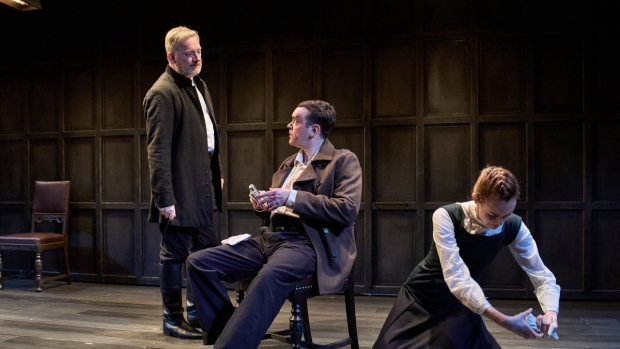”Mary” at the Hampstead Theatre – review

© Manuel Harlan
In the James Plays, first staged in 2014, Rona Munro wrote one of the great history play trilogies of this or any other age. Huge and riveting to watch, they traced the history of Scotland, making the past come alive and speak to the present with remarkable power. She is continuing tracking the monarchs called James with three more plays imagined. In the meantime, comes Mary, a disappointing standalone addition to this ambitious undertaking.
It takes the story of Mary Queen of Scots and presents it from a side-on view, revealing Mary through the eyes of three of her court – diplomat James Melville, her supporter since childhood, a Protestant firebrand called Agnes, who fears the Queen will betray the new Protestant religion, and man on the make Thompson, who sides with the Scottish lords who want the Queen gone.
Via two longish scenes of testimony – one led by Melville and one with Thompson in charge – the play examines the crucial and complicated events of 1567 after Mary’s husband Darnley is murdered and she marries the man thought to have killed him, the Earl of Bothwell. The results were disastrous: it led to rebellion, abdication and ultimately to Mary’s death. Munro’s contention is that Mary was raped and forced to go through with the marriage against her will.
It’s an interesting take on the life of the Queen, more traditionally presented as a romantic heroine who followed her heart not her head and always chose the wrong man. Here she emerges as a victim of her gender, a woman in a man’s world of scheming politics and religious divides. The trouble is, we barely see Mary – she just flits across the stage occasionally – and the play is, for all its feminist credentials, really a study of a man, the conflicted Melville.
Douglas Hensall, fresh from his triumph in Shetland, plays him with biting control. He is a man who is so confident that he is in charge of events that his own blind-siding takes him by surprise; so does the revelation that he could behave as he does, abandoning his Queen in her hour of need.
Rona Morison, as Agnes, matches him, step for step. It’s hard to believe in the character – would a serving maid in a 16th century court have been quite so bold in speaking out for her religious beliefs and against her mistress? And she doesn’t get much to say; when she complains she hasn’t spoken for ten minutes while the men argue on, it’s true.
But Morison makes Agnes convincing in her own right, her straight-armed certitude of Mary’s wrongness suddenly shaken by her realisation of mutual vulnerability. Brian Vernel completes an impressive trio of performances as Thompson, by turns shifty and chippy, frightened and frightening.
Munro’s writing is always beautifully pitched and poised. Yet here, somehow, it feels devoid of passion. The play is just three people talking rather slowly in a room. In Ashley Martin Davis’s skilful design, the room looks lovely, with its panelled walls and Matt Haskin’s beautifully modulated lighting casting the players in the rich hues of a period painting. But Roxana Silbert’s direction is calm to the point of somnolence; there’s nothing to leaven the pace until an ill-judged intervention right at the close.
Instead of gripping, the play’s conflicts – between a Protestant nation and a Catholic Queen, between men clinging to power and women holding on to their lives, between truth and lies – circle around without ever taking flight. It’s a curiously airless undertaking.










